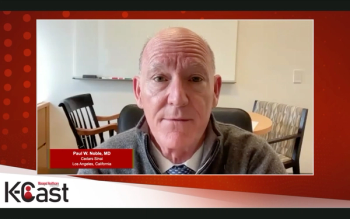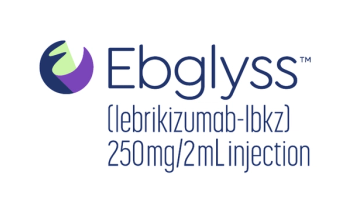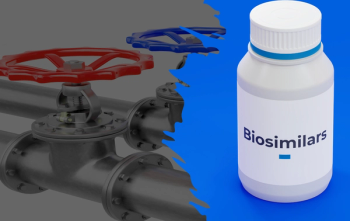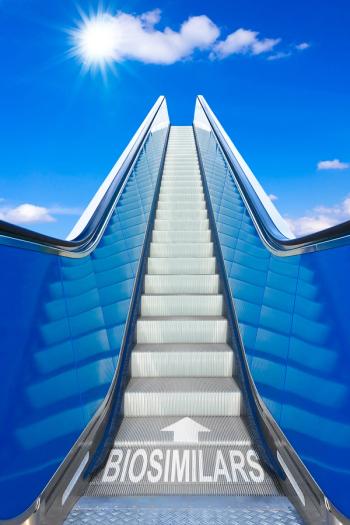
- MHE June 2022
- Volume 32
- Issue 6
A Surge of Biologics for Severe Asthma
Six biologics are on the market and more are in the pipeline. Biologics target the inflammatory cytokines involved in the pathogenesis of asthma.
Asthma is a chronic respiratory disease that causes narrowing and inflammation of the airways that compromises breathing and, in some cases, can be fatal. Symptoms include coughing, wheezing, shortness of breath, chest tightness and chest pain. Nearly 25 million people in the United States have asthma, and 10 people die from the disease daily.
Current asthma treatment aims to prevent exacerbations (asthma attacks) and relieve symptoms when exacerbations occur. Traditional therapies include inhaled corticosteroids, long- and short-acting beta-agonist inhalers, long- and short-acting inhaled anticholinergics, leukotriene receptor antagonists and oral corticosteroids.
Most asthma cases are treatable using the currently available therapies mentioned. But about 10% of people with asthma do not respond to standard treatments and are considered to have severe asthma. The Global Initiative for Asthma (GINA) defines severe asthma as asthma that is not controlled by proper use of high-dose inhaled corticosteroids and long-acting beta-agonists or that worsens when high doses of these drugs are lowered.
Individuals with severe asthma often have persistent debilitating symptoms and require frequent use of inhalers and long-term use of oral corticosteroids. Although systemic corticosteroids can effectively treat asthma symptoms and exacerbations, their long-term use carries the risk of undesirable side effects, including osteoporosis and diabetes.
The good news is that research into the pathogenesis of asthma has led to the development of biologics that target cytokines directly involved in causing severe asthma symptoms. These cytokines include interleukin (IL)-4, IL-5 and IL-13, which are responsible for the high levels of eosinophils and immunoglobulin E (IgE) seen in some types of severe asthma.
Severe asthma is classified into three types based on patients’ response to treatment and the presence of certain biomarkers: allergic asthma, eosinophilic asthma, and noneosinophilic asthma.
Allergic asthma is triggered by exposure to allergens, such as pollen, dust and pet dander. Patients with this type of asthma typically have increased levels of IgE as a response to allergen exposure. People with eosinophilic asthma have high levels of eosinophils that trigger inflammation of the airways. Individuals who have noneosinophilic asthma have few if any eosinophils in lab results, although some may have high levels of neutrophils.
When it comes to treatment, patients with severe allergic or eosinophilic asthma tend to respond to inhaled corticosteroids and biologics that target biomarkers prevalent in these types of asthma. But inhaled corticosteroids are not effective for those with noneosinophilic asthma, and only one of the currently available biologics targets a cytokine active in this type of asthma.
Approved biologics
The past few years have seen a surge in the development and approval of biologics to treat severe asthma. Many of them target cytokines directly involved in the pathology of severe asthma, leading to reduced use of oral corticosteroids and significant decreases in severe exacerbations. As of 2021, GINA guidelines for the management of severe asthma include biologics as add-on therapy for severe allergic and eosinophilic asthma.
The biologics the FDA has approved as a treatment for severe asthma include Cinqair (reslizumab), Dupixent (dupilumab), Fasenra (benralizumab), Nucala (mepolizumab), Tezspire (tezepelumab), and Xolair (omalizumab).
Xolair, developed by Swiss company Novartis, was the first biologic approved in the U.S. and the EU for children and adults with severe asthma. It is an anti-IgE monoclonal antibody for use in adults and children aged 6 and older with severe allergic asthma.
Fasenra, developed by British-Swedish pharmaceutical giant AstraZeneca is an IL-5 receptor antagonist. The FDA approved the drug in 2017 as add-on treatment for severe eosinophilic asthma in adults and children aged 12 and older. In 2019, the FDA approved the Fasenra Pen, a prefilled auto-injector for self-administration of the drug.
GlaxoSmithKline’s Nucala and Teva Pharmaceutical’s Cinqair are IL-5 antagonists indicated as add-on therapy for eosinophilic asthma. Nucala, FDA-approved in 2015, is indicated for use in adults and children as young as 6 years. In January of this year, the FDA approved Nucala Autoinjector and prefilled syringes for self-administration for children, two and a half years after they were approved for adults. Cinqair, approved in the U.S. in 2016, is for intravenous use only in patients aged 18 and older.
Dupixent, coproduced by Regeneron Pharmaceuticals in upstate New York and French company Sanofi, received FDA approval in 2018 as add-on therapy for moderate to severe eosinophilic asthma in patients aged 12 and older. It had been previously approved as a treatment for eczema.
In October 2021, the FDA expanded Dupixent’s indication to include children aged 6 to 11 years. In 2020, the agency approved a Dupixent prefilled pen for self-injection. Dupixent is an IL-4 inhibitor with dual inhibitory action against IL-4 and IL-13 signaling.
Tezspire, produced by Amgen and AstraZeneca, is a first-in-class thymic stromal lymphopoietin (TSLP) blocker. TSLP is an epithelial cytokine responsible for starting a cascade of inflammation in asthma. Tezspire is the first agent with FDA-approved indications for all types of severe asthma, including noneosinophilic asthma, regardless of the presence of biomarkers. The agent was FDA approved in December 2021 as add-on treatment in patients aged 12 and older with severe asthma.
Severe asthma pipeline
Research continues to open new pathways in the treatment of severe asthma. Although biologics have done well in controlling severe eosinophilic and allergic asthma, a treatment need remains for patients with severe noneosinophilic asthma who do not respond to corticosteroids. Additionally, current biologics consist of injectable agents, many of which must be administered by a healthcare professional. A few companies are investigating new oral drugs and inhalers for use in patients with severe asthma.
Masitinib
Masitinib, from AB Science, a French company, is an oral tyrosine kinase inhibitor that selectively targets mast cells involved in mucus production and airway inflammation. In a phase 3 study, masitinib significantly reduced the rate of severe asthma exacerbations in patients with severe eosinophilic and noneosinophilic asthma compared with placebo.
Depemokimab
GlaxoSmithKline is conducting a phase 3 trial investigating the safety and efficacy of depemokimab as an add-on treatment in patients 12 years and older with severe eosinophilic asthma. Depemokimab, a long-acting IL-5 inhibitor, would become the first long-acting treatment for this condition if approved by the FDA. Current IL-5 inhibitors are dosed every 4 weeks or every 8 weeks. Depemokimab is designed to be administered every 6 months. The trial is scheduled to be finished in late 2023.
Inhalers in the works
AstraZeneca and British drug company Avillion are developing a combination inhaled short-acting beta-agonist (albuterol) and corticosteroid (budesonide) for use as rescue therapy. In a phase 3 trial, the albuterol/budesonide combination significantly reduced the risk of severe asthma exacerbations when used as rescue treatment versus albuterol alone in participants with moderate to severe asthma.
Ecleralimab is a TSLP inhibitor developed by Novartis as an inhaler for maintenance treatment of moderate to severe uncontrolled asthma. If approved, ecleralimab would join Tezspire as a treatment option for patients with all types of severe asthma. Ecleralimab is currently in a phase 2 study that is scheduled to be completed in 2024
Articles in this issue
over 3 years ago
Making Contraception More Availableover 3 years ago
Medicaid Managed Care Plans Coming Under Scrutinyover 3 years ago
ACO Update: The Pathways to Success Programover 3 years ago
Aduhelm: Great Expectations Fizzleover 3 years ago
Paxlovid Rebound: Rare But RealNewsletter
Get the latest industry news, event updates, and more from Managed healthcare Executive.























